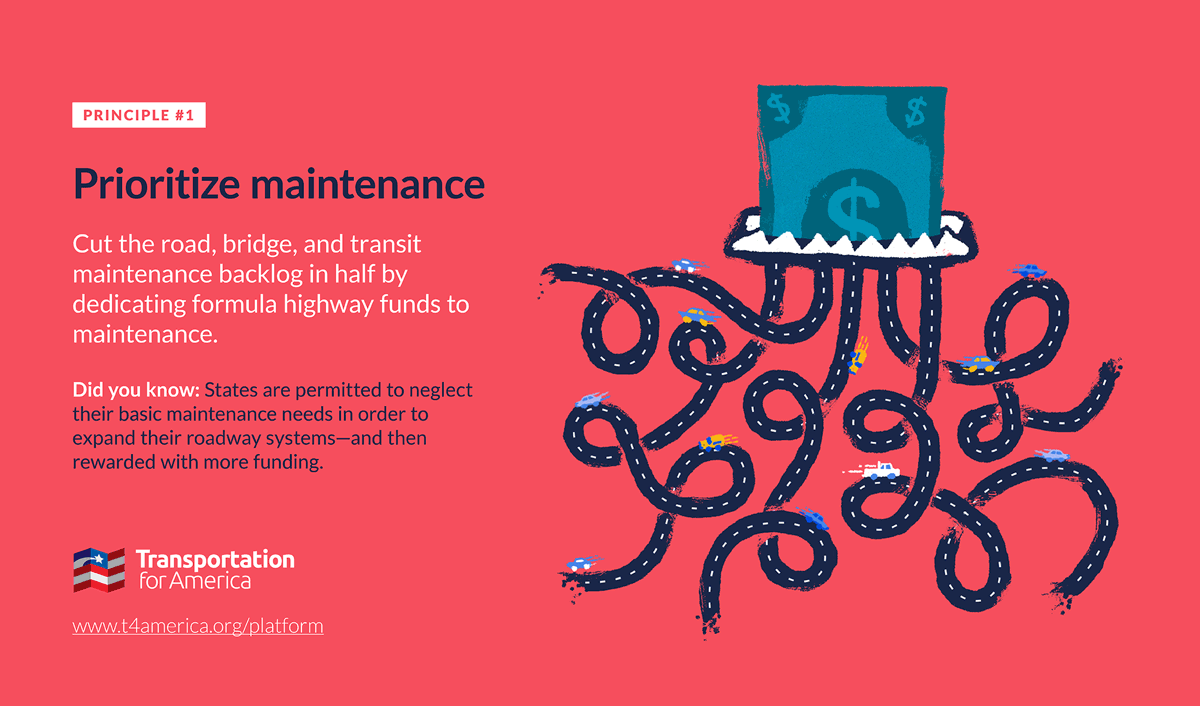Diverse groups propose cost-effective strategies to get the most for our transportation money
Transportation for America, the Reason Foundation and Taxpayers for Common Sense show how to modernize systems, increase safety and reduce congestion
WASHINGTON, D.C. – A new report released today by Reason Foundation, Taxpayers for Common Sense and Transportation for America proposes cost-effective recommendations that Congress should consider as part of the pending transportation bill that will stretch our limited transportation dollars, save money in the long run, cut congestion, and better maintain the existing system.
The jointly written report, “The Most for Our Money: Taxpayer Friendly Solutions for the Nation’s Transportation Challenges,” introduces innovative approaches that will expand the efficiency of our infrastructure while keeping costs in check.
“Needless to say, the obstacles facing our transportation system are large, especially given the current state of the economy and difficult funding climate,” said James Corless, director of Transportation for America. “But by making smart, selective choices about how our vital dollars are spent — fixing what we have first and looking for ways to better utilize the system — we can maintain our current network and better meet changing transportation needs.”
The report outlines seven specific tools – some big, some small – that would significantly improve our nation’s transportation system by reducing future congestion, plan for the future, better utilize existing capacity and increase the safety of our roads and bridges.
For example, the implementation of Transportation Scenario Planning would bring together local governments, metropolitan planning organizations, and regional councils to assess forecasted data on transportation demands and develop “what-if” scenarios to indicate how potential systems would function as populations expand. Legislators, businesses and the public then assess these scenarios and come to agreement on the most favorable solution. Many communities find that changes to “business as usual” result in a more efficient transportation system at a lower cost. Scenario Planning has been used in various states and regions, and was recently embraced by Chicago in its “GO TO 2040” plan to develop a new transportation system by 2040 that would meet the city’s growing population and transportation needs.
“Staring down the barrel of trillion-dollar budget deficits, federal taxpayers are demanding more bang for their buck, and transportation spending is no exception,” said Erich W. Zimmermann, Senior Policy Analyst at Taxpayers for Common Sense. “Our work highlights a number of opportunities to do more with less. For example, scenario planning, modeled on strategic military planning, enables a community to consider various options and choose the one that best suits its fiscal and transportation needs.
Another innovative approach the report recommends is to reduce congestion on the road by expanding the use of High-Occupancy Toll (HOT) lanes. HOT lanes are reserved for buses and other high-occupancy vehicles. Single-occupancy vehicles wishing to access the less congested HOT lanes pay a fluctuating rate based upon the number of vehicles in the HOT lanes to ensure they keep traffic moving. These lanes have already been introduced in cities around the country, and in Southeast Florida alone, saved commuters nearly $9 million in just six months.
“While HOT lanes and Bus Rapid Transit are certainly not new or flashy innovations, the purpose of our recommendations is to encourage Congress to rethink the way we finance and design our transportation systems and support the expansion of these types of low cost, efficient solutions,” said Shirley Ybarra, senior transportation policy analyst for Reason Foundation and former Virginia secretary of transportation. “We’re offering innovative ideas, free-market solutions, and simple fixes that will help us get the most for our money.”
The report also recommends five additional strategies, including:
- Bus Rapid Transit (BRT);
- Intelligent Transportation Systems (ITS);
- Intercity Buses;
- Teleworking; and
- Local Street Connectivity
“It is imperative that Congress seriously consider these tools in the next six-year transportation reauthorization,” said Zimmermann. “Implementing strategies like these is an easy way for Congress to make America’s transportation more effective, efficient and convenient without breaking the bank.”
To view the report, click here.
###
TRANSPORTATION FOR AMERICA (T4) is the largest, most diverse coalition working on transportation reform today. Our nation’s transportation network is based on a policy that has not been significantly updated since the 1950’s. We believe it is time for a bold new vision — transportation that guarantees our freedom to move however we choose and leads to a stronger economy, greater energy security, cleaner environment, and healthier America for all of us. We’re calling for more responsible investment of our federal tax dollars to create a safer, cleaner, smarter transportation system that works for everyone. www.t4america.org
TAXPAYERS FOR COMMON SENSE is a 501(c)(3) non-partisan budget watchdog serving as an independent voice for American taxpayers. Our mission is to achieve a government that spends taxpayer dollars responsibly and operates within its means. We work with individuals, policymakers, and the media to increase transparency, expose and eliminate wasteful and corrupt subsidies, earmarks, and corporate welfare, and hold decision makers accountable. www.taxpayer.net
REASON FOUNDATION is a nonprofit think tank dedicated to advancing free minds and free markets and publisher of the critically-acclaimed Reason magazine and its website www.reason.com. For more information, please visit www.reason.org.




















Pingback: Transportation For America » T4 teams up with fiscally conservative groups to promote innovative transportation solutions
Pingback: Strange Bedfellows Indeed…. | UrbanRoot Planning